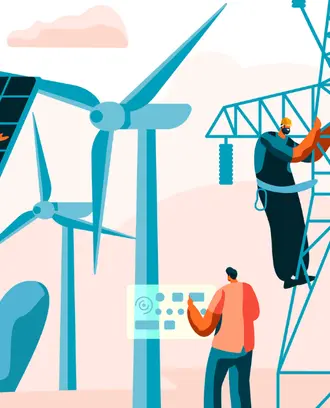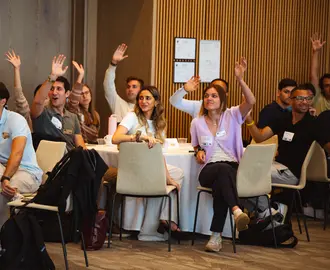Another New York Climate Week (NYCW) has come to a close, and we returned to MIT campus feeling inspired and energized as we press on with our commitment to taking climate action now.
Educating a climate-ready workforce
With over 900 NYCW events and activities, our Senior Associate Director, Jennifer Graham, went in with three goals in mind: explore sustainability jobs, learn about job market trends, and engage with our alumni, many of whom were featured on various panels throughout the week.
A few standout events included:
- “Bridging the Sustainability Skills Gap: How to Build Your Climate Workforce” hosted by OnePointFive
- “Growing Green: Cultivating Talent for a Sustainable Future” hosted by The Nest Climate Campus
- “Sourcing Diverse Talent for your Team” hosted by Green Jobs Board
"Bridging the Sustainability Skills Gap" hosted by OnePointFive
One key takeaway from NYCW? Both candidates and employers must navigate the complexities of emerging sustainability roles. For students, this means building a strong foundation in sustainability strategy while also developing deep industry-specific skills in sectors like energy, agriculture, or finance. Staying adaptable and continuously learning new skills will be key to thriving in this rapidly evolving landscape. For employers, it involves addressing the rapid growth of green jobs and developing a workforce prepared to meet the challenges of this emerging sector.
To meet the goal of achieving net zero emissions by 2050, doubling the size of the climate workforce is essential. However, the rapid growth of climate jobs is outpacing the available talent, leaving companies struggling to find qualified professionals. If this skills gap isn't addressed, achieving critical sustainability targets will be at risk.
With the climate workforce growing at three times the rate of traditional sectors, academic institutions play a crucial role in preparing students for this rapidly evolving field. Academic programs must offer clear career pathways, integrating experiential learning, internships, and fellowships, to equip students with both foundational sustainability knowledge and industry-specific expertise. Additionally, the extensive networks that academia provides—connecting students with industry leaders, faculty, alumni, and professionals—are invaluable in helping students access opportunities and build the relationships necessary to thrive in the green economy.
As the green economy expands, simply having foundational climate knowledge is not enough. Moving from broad awareness to deep, specialized skills is critical.
But that’s not all. This new generation of workers is increasingly concerned about greenwashing – they want to make real, tangible impacts. Universities and businesses that fail to align their actions with their sustainability goals risk losing valuable talent.
More than ever, sustainability is no longer an isolated function or trend—it’s evolving into a core business skill. Jennifer emphasized this to students earlier this semester, sharing that “as the green economy expands, simply having foundational climate knowledge is not enough. Moving from broad awareness to deep, specialized skills is critical”. To set students up for success, we must educate them on areas like Scope 3 emissions, understanding climate risks, and integrating sustainable practices into supply chains. Building a climate-ready workforce is fundamental to long-term business success in the 21st century.
The MIT Sloan School of Management and its Sustainability Initiative (S.I.) are uniquely positioned to help address these challenges.
For practitioners looking to build their climate-ready workforce:
- Take an MIT Sloan Executive Education Course. For employers focusing on workforce development, executive education can be a great resource in gaining a new perspective on sustainability from leading MIT Sloan faculty experts.
- Hire sustainability students as interns (or employees). Our world-class master’s students and grads are ready to unpack a sustainability issue of strategic importance to your organization.
- Take advantage of our Sustainable Business (S-Lab) course. Our students help you tackle a new sustainability initiative or challenge at your organization, bringing insight and rigor to your sustainability strategy.
For current and prospective MIT students seeking to join the climate workforce:
- Join our Sustainability Certificate cohort. This certificate helps students turn rigorous knowledge into meaningful action.
- Apply for our Sustainability Internship programs. MIT graduate students interested in sustainability-oriented internships have two options in the Sloan Social Impact Fund and the Sustainability Initiative Internship Program.
- Attend our career and network building events and programs. Through speakers, internships, events, and topical learning, we help students build the knowledge and relationships they need to create their future careers.
The MIT Sloan Sustainability Initiative can play a role in closing the skills gap by equipping future and current business leaders with the necessary tools to meet critical sustainability goals while also fostering long-term business success.
Taking a systems approach to climate change
NYCW had much to offer, and MIT Sloan Sustainability Initiative’s Research Scientist, Idongesit Sampson, went into the week with her own goals as a researcher: explore the intersections of climate and health, food security, climate innovation, and sustainable investing.
Idongesit’s standout events included:
- “The Growth of The Global Adaptation Economy” hosted by the Systemic Climate Action Collaborative
- “Powering the Transition: The Next Frontier” hosted by The Wall Street Journal
- “Food System Innovations, Disruptions, and Transparency” and “A deep dive into Nature's wisdom: A conversation with Dr. Jane Goodall & Craig Foster” hosted by Deloitte
“A deep dive into Nature's wisdom: A conversation with Dr. Jane Goodall & Craig Foster” hosted by Deloitte
These insightful sessions underscored the importance of taking a systems approach in confronting climate change.
The relationship between food systems and climate change in particular was a popular topic at NYCW this year – for good reason. We suffer major inefficiencies in food finance, which exacerbates climate issues and hinders sustainable development. However, the World Bank’s 2021 report on Food Finance Architecture emphasizes that food finance could also serve as a lever for transformative change in our food systems.
As such, NYCW called for coordinated efforts in tackling climate change and broader sustainable development challenges. Using a systems lens allows us to view the social, environmental, and economic factors of this work as interconnected, not disparate.
While there is undoubtedly much work ahead in translating knowledge into actionable practice, there is a palpable sense of hope.
MIT is no stranger to systems change. The MIT Sloan School of Management is the birthplace of systems thinking, system dynamics, and modeling of complex human and environment interactions. Given that, the Sustainability Initiative is deeply committed to advancing systems change for an equitable and sustainable world.
Idongesit’s research is focused on systemic investing – alongside S.I.'s Executive Director, Jason Jay, they are forging a pathway to a more sustainable future through their work on the Owning Impact Project.
As we continue to reflect on NYCW, we feel that Idongesit put it best: “while there is undoubtedly much work ahead in translating knowledge into actionable practice, there is a palpable sense of hope.”



